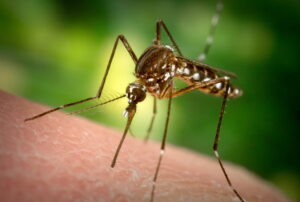Tag: EEE
Bursting the PC Bubble: EEE Outbreak Wreaks Havoc in New England
by The Cowl Editor on September 12, 2019
National and Global News

by Kyle Burgess ’21
News Co-Editor
In an email addressed to the Providence College community on Sept. 3, Vice President for Student Affairs Kristine Goodwin relayed an announcement from the Rhode Island Department of Health (RIDOH) confirming the first human case of Eastern Equine Encephalitis within the state in nearly a decade.
While more commonly referred to as EEE, the disease itself is transmitted via mosquito bites and is known for various symptoms such as fevers, stiff neck, headaches, convulsions, brain swelling, and, in some cases, death, with no specific treatments currently available.
While its reemergence in humans this month has been sudden, New England is no stranger to “Triple E.” In fact, the first documented case of the virus occurred in Massachusetts in 1831, when 75 horses died under mysterious circumstances.
Fast forward nearly two centuries and communities in Massachusetts as well as Rhode Island once again find themselves under siege from EEE, due in large part to a higher-than-average risk for mosquito-born illnesses this summer in New England.
Since Goodwin’s email, a five-year-old girl and an elderly woman in her mid-60’s have also contracted EEE and find themselves in critical condition according to ABC, while the individual to whom Goodwin made reference in her note has passed away as a result of the virus.
In efforts to combat the spread of the disease, the Deputy Director of RIDOH has advised that citizens be proactive in preventing exposure to mosquito bites through a variety of measures such as applying insect repellent, remaining indoors from dusk to dawn, and wearing long-sleeve shirts and pants.
Meanwhile, the state of Rhode Island itself has conducted aerial spraying for the first time since 1996 over areas where the disease has been reported, with Massachusetts towns conducting similar mosquito-spraying exercises following the two recently reported cases in Middlesex county.
The pesticide itself is planned to be used at very low concentrations with no adverse risks to human health anticipated, although exposure to these flyovers can be prevented by avoiding the outdoors immediately after and keeping windows shut.
Officials in Massachusetts have stated that 36 communities in the state are now at critical risk for EEE, with 42 at high risk and 115 at moderate risk of the disease. Rhode Island, Central Falls, Westerly, West Warwick, and northern Rhode Island all find themselves at risk of EEE and can expect regular spray-overs until the threat of contamination has been contained.
Here at PC, administrators have stated they are continuing to monitor catch basins, remove standing water, inspect the campus for potential contamination, and monitor test results from the Department of Environmental Management (DEM). DEM itself is responsible for the pesticide flyover campaign, with its chief of agriculture Kenneth Ayars claiming, “It’s time to go above and beyond our usual measures” to combat the disease.
If you feel that you are suffering from any of the symptoms listed above, contact the health center on campus at (401) 865-2422.
